ABOUT THE BOOK The spiritual influence of Jelaluddin Rumi (12071273) is increasing among people of diverse beliefs throughout the western world. Rumi is now recognized here in the West, as he has been for seven centuries in the Middle East and Western Asia, as one of the greatest literary and spiritual figures of all time. Rumi is a spokesman for the religion of love in the language of the heart. Recent translations of Rumis work have brought forth a variety of different qualities, exploring the subtlety, grace, and electricity of his verse. This book presents his spiritual teachings concisely and comprehensively, in a translation that touches heart and mind. The Mathnawi, from which these selections have been taken, is one of the greatest spiritual masterpieces ever written.
Its content includes the full spectrum of life on earth, as well as the vertical dimension to the highest levels of metaphysics and cosmic awareness. CAMILLE HELMINSKI is codirector, with her husband, Kabir Helminski, of the Threshold Society of Santa Cruz, California. She holds an honorary doctorate in Arabic from the University of Damascus and the World Union of Writers (Paris). KABIR HELMINSKI is the author of Living Presence: A Sufi Way to Mindfulness and the Essential Self, as well as the translator of numerous books of Sufi literature and especially Rumi. He is the codirector, with his wife, Camille Helminski, of the Threshold Society, a nonprofit organization dedicated to sharing the knowledge and practice of Sufism. As the publisher of Threshold Books for some twenty years, he was largely responsible for making Rumi the most widely read poet of our time.
As a producer and writer of Sufi music, he has gained recognition for numerous recordings, including his own Garden within the Flames. He is a representative of the Mevlevi tradition founded by Jelaluddin Rumi. Sign up to learn more about our books and receive special offers from Shambhala Publications.  Or visit us online to sign up at shambhala.com/eshambhala.
Or visit us online to sign up at shambhala.com/eshambhala.  SHAMBHALA PUBLICATIONS, INC. Horticultural Hall 300 Massachusetts Avenue Boston, Massachusetts 02115 www.shambhala.com 1994 by Camille & Kabir Helminski Cover based on a detail from the Late Shahjahan Album, courtesy of the Sackler Gallery/Smithsonian Institute.
SHAMBHALA PUBLICATIONS, INC. Horticultural Hall 300 Massachusetts Avenue Boston, Massachusetts 02115 www.shambhala.com 1994 by Camille & Kabir Helminski Cover based on a detail from the Late Shahjahan Album, courtesy of the Sackler Gallery/Smithsonian Institute.
Published by arrangement with Threshold Books All rights reserved. No part of this book may be reproduced in any form or by any means, electronic or mechanical, including photocopying, recording, or by any information storage and retrieval system, without permission in writing from the publisher. Library of Congress Cataloging-in-Publication Data Jall al-Dn Rm, Maulana, 12071273. [Ma s nav. Book 12. English.
Selections] Rumidaylight: a daybook of spiritual guidance. p. cm. Translation by Camille Adams Helminski and Edmund Kabir Helminski of selected verses from Ma s nav, book 12. Includes index. eISBN 978-0-8348-2517-8 ISBN 1570625301 (paper) 1.
Sufi poetry, Persian Translations into English. I. Helminski, Kabir, 1947 . II. Helminski, Camille Adams, 1951 . Title. IV. IV.
Title: Daylight. PK6481.M8E2 1999 891.5511dc21 9932290 CIP A FTER eleven years of turning to the Mathnawi of Jelaluddin Rumi for light, the idea came that this light might be made more readily available to more people in the format of a daybook. Rumi: Daylight comes to you as an offering, as a tool, as a possible source of insight and refreshment, support and encouragement. It may be used from the first day of the year to the last to deepen a whole cycle or at special moments, opened randomly. May your hand be guided as you turn the pages; and may the voice within these words soothe and strengthen your soul. For the way is only difficult until it becomes easy.
Moments of ease, though, may come and go numerous times before one arrives and learns to live in a new land. The verses are presented here in the order in which they would be found within Books I and II, which hold roughly a third of the 25,632 lines of the whole six books of the Mathnawi. Although other possibilities presented themselves, keeping true to the pattern woven in the Mathnawi seemed best. As when one walks along the shore of the ocean, one finds treasures in the sand, so here, too, one may look down and discover a precious piece to hold close for awhile. In making this selection, I attempted to choose short sections that would stand alone and elucidate our lives. I recognize though that any selection is limited to time and place, and that were I to journey through the same two books of the Mathnawi now, I might surface with different lines to share with you, or if you made that journey yourself, you might choose different words. Those published here are a beginning and will, I hope, give a strong taste of the guidance and wisdom that comes through the vehicle of Mevlana Jelaluddin Rumi, may God preserve his secret, and help us all to recognize the shop of Oneness, the Ocean that has many harbors, yet where there is no division between man and man, or woman, but only a unity of souls in the process of return to their Creator, Whose breath lives inside each one and helps to guide us home.
Many thanks flow out to all who have lent support to this projectmany helping hands and hearts have been involved in the process, among them are Lora Gobel, Tom Goldberg and George Witterschein who helped in editing. What a blessing it has been to work together with my husband, Kabir. We are grateful for the extensive groundwork established by R.A. Nicholson in his full translation of the six books of the Mathnawi. Kabir and I hope to continue our work with the Mathnawi and bring kernels from the remaining four books to you soon. Continually sustaining us has been the presence of Sheikh Suleyman Hayati Dede, may God preserve his secret. He mirrored to us in reality the beauty and breadth of Mevlana Jelauluddin Rumi, witness of God.
May we take Mevlana as an example and open to the whisper of God in our own hearts that our words, too, may become fragrant and full of nourishment. Camille Adams Helminski Putney, Vermont 1990 I N the last decades of the twentieth century the spiritual influence of Mevlana Jelaluddin Rumi is being strongly felt by people of diverse beliefs throughout the Western world. He is being recognized here in the West, as he has been for seven centuries in the Middle East and Western Asia, as one of the greatest literary and spiritual figures of all time. Different qualities of Rumi have been brought forth by a variety of new translations that have appeared during the nineteen-eighties. He has been presented as both refined and sensual, sober and ecstatic, deeply serious and extremely funny, rarefied and accessible. It is a sign of his profound universality that he has been so many things to so many people.
It is our wish in this book to begin to present his spiritual teachings concisely and comprehensively, to offer some jewels from this vast treasure. Jelaluddin Rumi was born in 1207 in Balkh in what is today Afghanistan. At an early age his family left Balkh because of the danger of the invading Mongols and settled in Konya, Turkey, which was then the capital of the Seljuk Empire. His father Bahauddin was a great religious teacher who received a position at the university in Konya. Mevlanas early spiritual education was under the tutelage of his father Bahauddin and later under his fathers close friend Sayyid Burhaneddin of Balkh. The circumstances surrounding Sayyids undertaking the education of his friends son are interesting: Sayyid had been in Balkh, Afghanistan, when he felt the death of his friend Bahauddin and realized that he must go to Konya to take over Jelaluddins spiritual education.
Next page
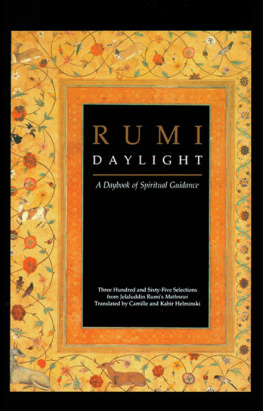

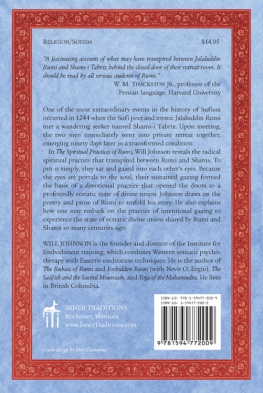
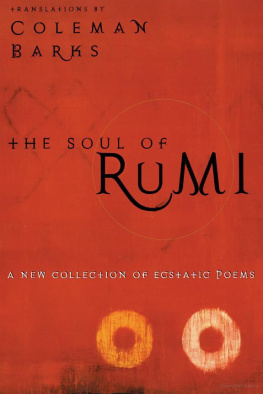
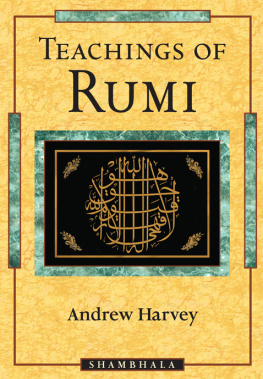
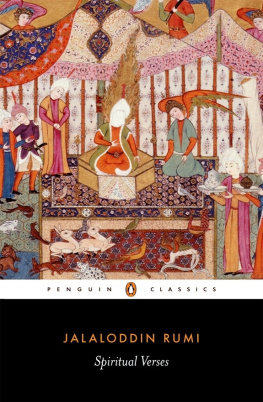
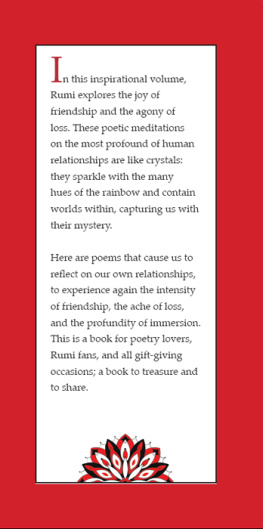
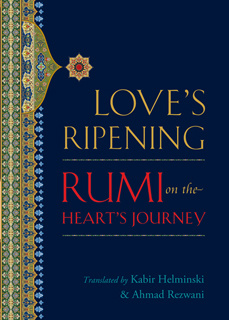
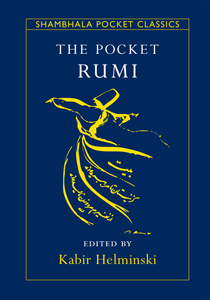
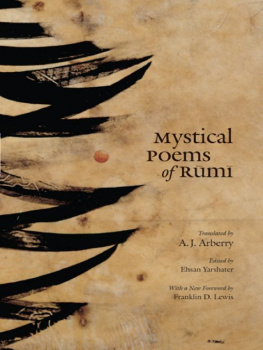
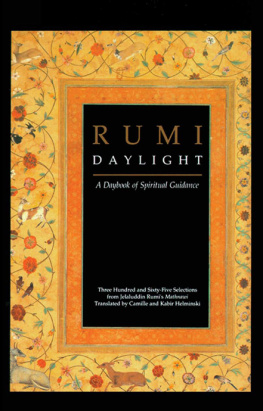
 Or visit us online to sign up at shambhala.com/eshambhala.
Or visit us online to sign up at shambhala.com/eshambhala.  SHAMBHALA PUBLICATIONS, INC. Horticultural Hall 300 Massachusetts Avenue Boston, Massachusetts 02115 www.shambhala.com 1994 by Camille & Kabir Helminski Cover based on a detail from the Late Shahjahan Album, courtesy of the Sackler Gallery/Smithsonian Institute.
SHAMBHALA PUBLICATIONS, INC. Horticultural Hall 300 Massachusetts Avenue Boston, Massachusetts 02115 www.shambhala.com 1994 by Camille & Kabir Helminski Cover based on a detail from the Late Shahjahan Album, courtesy of the Sackler Gallery/Smithsonian Institute.